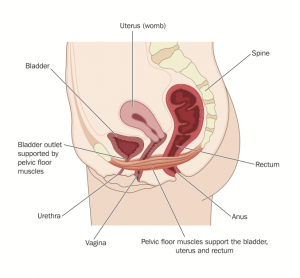 Pelvic Floor Control
Pelvic Floor Control
Both men and women can experience bladder problems and other symptoms of pelvic floor weakness related to urological or gynaecological conditions or operations, which can be eased with specialist physiotherapy. Women can be particularly vulnerable to urinary incontinence and other symptoms related to their pelvic floor muscles when they are pregnant, postnatally, around the menopause and as they get older.
Therapist: Serena Hampson


 Let Us Help You Take Control!
Let Us Help You Take Control!
The Valley Clinic offers specialist therapy to help improve pelvic floor function.
Pelvic Floor MOT
Empower your pelvic floor.
Optimise your control.

Post Gynaecological Surgery
We can identify any risk factors and support a return to full fitness.
Post Natal support
We can help you to strengthen and optimise your pelvic floor control.
We can offer advice on safely returning to exercise and sport.

Bladder Control
We can help promote pelvic floor strength.
We can help clients improve their continence.
Serena Hampson
 Serena is an experienced Pelvic and Women’s Health Physiotherapist working in both NHS and at The Valley Clinic. She is a member of the Pelvic Obstetric and Gynaecological Physiotherapy group (POGP) and has a Postgraduate Certificate in Continence for Physiotherapists from The University of Bradford. Serena has also undertaken postgraduate training in Female Urinary Dysfunction, Lower Bowel Dysfunction, Menopause Management for Physiotherapists and Pregnancy related Physiotherapy: the childbearing year. She is actively involved in the development of local and national postnatal pathways and believes all women should be offered expert postnatal care to help them recover and thrive.
Serena is an experienced Pelvic and Women’s Health Physiotherapist working in both NHS and at The Valley Clinic. She is a member of the Pelvic Obstetric and Gynaecological Physiotherapy group (POGP) and has a Postgraduate Certificate in Continence for Physiotherapists from The University of Bradford. Serena has also undertaken postgraduate training in Female Urinary Dysfunction, Lower Bowel Dysfunction, Menopause Management for Physiotherapists and Pregnancy related Physiotherapy: the childbearing year. She is actively involved in the development of local and national postnatal pathways and believes all women should be offered expert postnatal care to help them recover and thrive.
Serena provides expert assessment and specialist treatment for a wide range of pelvic health conditions including:
- Pelvic Floor muscle weakness or dysfunction
- Bladder problems
- Bowel problems
- Pelvic organ prolapse
- Dyspareunia (painful intercourse)
- Diastasis rectus abdominis (tummy muscle gap)
- Menopause symptoms
- Post gynaecological surgery rehabilitation
- Pelvic pain conditions
- Pregnancy related conditions
- Postnatal problems
Serena understands the sensitive nature of many of these conditions and prides herself in putting clients at ease, allowing them to talk about their concerns openly.
She is enthusiastic about running and women’s wellbeing and is always happy to offer support and advice to women.
Pelvic Floor Muscles refer to the group of muscles in the lower part of the abdomen which support the pelvic organs (bladder, bowel and uterus) and span the bottom of the pelvis. These muscles control the sphincters which allow us to control our bladder and bowel. Pelvic floor muscles are also important for sexual function in males and females.
The Valley Clinic offers specialist therapy to help improve pelvic floor function.
Pelvic Floor MOT
- Empower your pelvic floor.
- Optimise your control.
Post Natal support
- We can help you to strengthen and optimise your pelvic floor control.
- We can offer advice on safely returning to exercise and sport.
Post Gynaecological Surgery
We can identify any risk factors and support a return to full fitness.
Bladder Control
- We can help promote pelvic floor strength.
- We can help clients improve their continence.
Involuntary urination, is any leakage of urine or fecal matter. It can be a common and distressing problem, which may have a profound impact on quality of life. Urinary incontinence almost always results from an underlying treatable medical condition but is under-reported to medical practitioners.
Prolapse literally means “to fall out of place‚” from the Latin prolabi meaning “to fall out.” In medicine, prolapse is a condition where organs, such as the uterus, fall down or slip out of place. It is used for organs protruding through the vagina or the rectum or for the misalignment of the valves of the heart.





